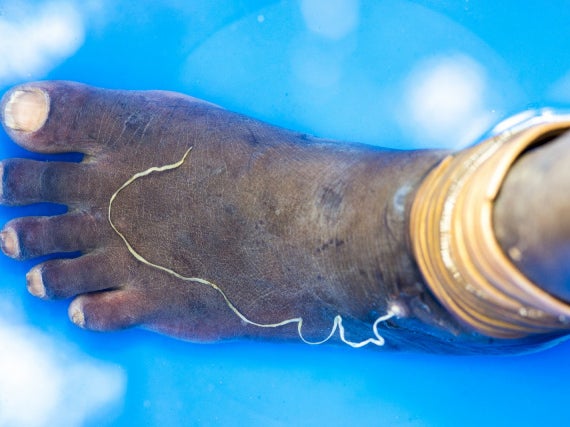UK to invest £450m fighting world’s most neglected tropical diseases
'These diseases belong to the last century,' says Priti Patel

Your support helps us to tell the story
From reproductive rights to climate change to Big Tech, The Independent is on the ground when the story is developing. Whether it's investigating the financials of Elon Musk's pro-Trump PAC or producing our latest documentary, 'The A Word', which shines a light on the American women fighting for reproductive rights, we know how important it is to parse out the facts from the messaging.
At such a critical moment in US history, we need reporters on the ground. Your donation allows us to keep sending journalists to speak to both sides of the story.
The Independent is trusted by Americans across the entire political spectrum. And unlike many other quality news outlets, we choose not to lock Americans out of our reporting and analysis with paywalls. We believe quality journalism should be available to everyone, paid for by those who can afford it.
Your support makes all the difference.Britain is to invest almost half a billion pounds of international aid funding in efforts to tackle some of the world’s worst infectious diseases.
The money will help protect more than 200 million people in developing countries like Ethiopia, Sudan, Bangladesh and India, as well as funding research into new cures for illnesses otherwise neglected by Western pharmaceutical companies.
The funding was announced on Sunday by Priti Patel, the International Development Secretary, ahead of a three-day summit on so-called neglected tropical diseases (NTDs).
NTDs affect 1.4 billion people in the poorest parts of the world. From Guinea worm to elephantiasis, they cause debilitating pain, disfigurement and death – but are all avoidable.
“These diseases belong to the last century,” Ms Patel said. “They cause unimaginable suffering and pain to some of the world’s poorest people, forcing them into a deeper cycle of poverty with no way out. Yet they are treatable.”
Ms Patel said the new commitment to fighting NTDs, more than doubling the UK’s annual spending pledged in the London Declaration of 2012, showed “global Britain” would continue to play its part despite the Brexit vote.
The Department for International Development said the new funding would pay for one billion treatments for people at risk of tropical diseases in the developing world. The UK is already one of the biggest partners, alongside the US and the Gates Foundation founded by Bill and Melinda Gates, in a global coalition pushing to eliminate NTDs.
The UK says the most immediate impact of the new funding will be to “wipe out” Guinea Worm altogether, the first such success story among the 17 tropical diseases on the NTDs list. When NGOs and government representatives meet for the summit in Geneva on Wednesday, a major announcement on the progress against Guinea worm is expected.
Guinea worm disease is caused by a parasite of the same name, which enters its human host through dirty drinking water infected with larvae.
Sufferers don’t show symptoms until about a year after infection, when the worm reaches maturity. It then causes the flesh to blister and burst, leaving the body and releasing a milky-white liquid containing millions of larvae – continuing the cycle of infection.
Elephantiasis – also known as Lymphatic filariasis – is transmitted by mosquitoes. It causes microscopic, thread-like worms to enter the human lymph system, damaging the body’s ability to maintain fluid balance. The characteristic, painful swelling which follows can make a person’s limb weigh as much as the rest of their entire body.
The UK said its new funding could help prevent tens of thousands of elephantiasis cases.
The funding announced on Sunday includes £205m of new support for affected communities around the world, to be spent over the next five years.
An additional £88m will go towards programmes for the development of drugs and diagnostics for NTDs, and research into how such treatments can be better delivered to hard-to-reach places.
Responding to the announcement, Bill Gates said: “UK aid and Britain’s world-leading research institutions are playing a major role in protecting the world’s poorest people from NTDs and enabling them to live healthier, more prosperous lives.
“With our foundation, I am proud to partner with the UK on global health and look forward to sharing more specifics about how we will further our commitment in the fight against NTDs this week at the summit in Geneva.”
Join our commenting forum
Join thought-provoking conversations, follow other Independent readers and see their replies
Comments